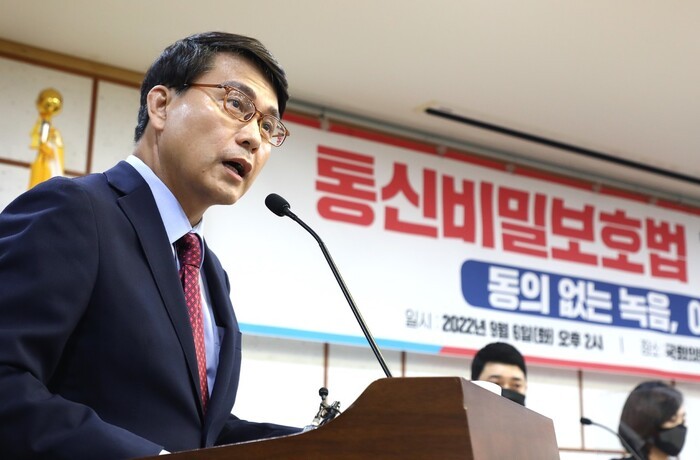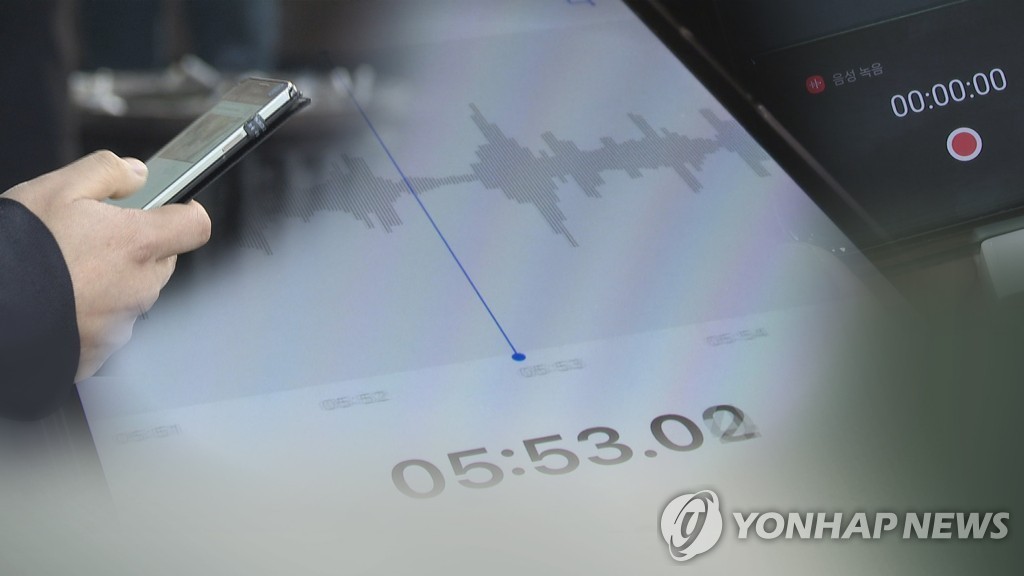On August 18, Yoon Sang-hyun, a member of the People Power Party proposed an amendment to the Communications Securities Protection Act that would prohibit the recording of conversations without to unanimous consent of all participants involved. The changes were already proposed five years ago and failed to pass. They have however resurfaced once again. The changes, if adopted, would result in imprisonment of up to 10 years and suspension of up to 5 years if found guilty. The goal is to prevent the indiscriminate permission of recorded conversations that are highly likely to infringe on individual privacy and personal rights. Yoon argues that the law is already in effect in some foreign countries and should also be introduced in South Korea. However, it drew strong opposition from the public, and I am also opposed to the proposal. There are a few reasons for my position. Recordings are critical bits of evidence in many court cases, they particularly assist the marginalized in protecting their rights and laws should be developed with the support of the public.
 |
| ▲ Yoon Sang-hyun of the People Power Party is speaking during a debate session on the proposed bill at the National Assembly on September 6. (Photo from Hankyoreh) |
The main reason why banning recordings should be reconsidered is that these files play a big role as crucial evidence in many legal disputes. They can be indispensable evidence when investigating crimes or resolving legal problems. In the case of phone scams such as voice phishing, they can be a great help in the collection of evidence or for the courts to fully grasp the situation when deciding on a case. If the proposed bill passes, available proof in litigation cases would be very limited, and this is especially concerning in the case of sex crimes or fraud. The investigation may suffer if the victim is deprived of a critical means of securing evidence against an alleged perpetrator who for their part may even try to destroy evidence. According to Kang Tae-wook, an advisory lawyer to the Personal Information Protection Commission, there are many cases that are hard to prove without recorded evidence and if the amendment passes, it will be more complicated to prove guilt. In the case of journalist reporting, a reporter may be subject to a counteraccusation or false accusations after reporting on a matter after conducting an interview. In addition, journalists are concerned that the ban on recording conversations will dampen coverage. A recorded file is the only way to review conversations that took place with a source. Without the recording, there is no way to prove what was reported was accurate if a source decides to backpedal on their own words. Namely, recording files ensure the public that a complete article will come out. Therefore, the amendment would be an unjust law that significantly harms the public interest by greatly harnessing media activities. The prohibition of recorded conversations will have a great impact on the legal profession too. Lawyers need to record client conversations to prepare for their cases as they often change their words. Banning the recording may produce disagreements between lawyers and clients. Moreover, recordings can function as a public good. Recordings can be valid evidence for public interest reports such as whistle-blowing. If they are prohibited, there would be a risk that public interest reports will be reduced.
Another problem is that a ban on recorded conversations is overlooking the fact that it will solely result in weakening the defense of the marginalized due to the impairment of the social accusation functions. Recording conversations has been used as a defense for the socially weak when exposed to sexual harassment, abusive language, and abuse of power by their superiors. For subway station employees suffering from the abusive language from the general public, a measure was recently set up to secure the evidence that is necessary for criminal punishment by attaching a recorder to the station employee's ID card. Recordings have also been utilized as a self-defense measure for employees that are often exposed to verbal violence and power abuse such as nurses, counselors, and caddies. The Hanjin family's abuse of power case indicates the importance of recording conversations. In 2018, a recorded file of Lee Myung-hee, an entrepreneur of the Hanjin family, verbally abusing and throwing things at a Filipino housekeeper for nearly 15 minutes was released, which caused a great stir. The ‘Choi Sook-hyun case’ is another example where violence perpetrated against the socially weak was revealed through recorded files. Triathlon athlete Choi Sook-hyun committed suicide after suffering from repeated beatings and verbal abuse by her superiors. She had to gather evidence of these assaults on her own to protect herself. She recorded and kept records of the outrageous beatings and verbal abuse by her superiors. The recordings were later released, sparking controversy. Thanks to these recordings, the perpetrators were found guilty and sentenced to prison. If the proposed bill is adopted, it will fundamentally block the way for the socially disadvantaged or those unfairly damaged to protect their rights.
 |
| ▲ A Combined Image of Clips Associated with Recording Conversations (Photo from Yonhap News) |
Finally, there is the fact that public opinion is generally opposed to the changes. On August 26, a survey was conducted of over 503 men and women aged 18 or older nationwide seeking their opinion on the proposal. It turned out that about two out of three people were skeptical about the idea. Moreover, complaints have also been raised by Samsung Electronics' Galaxy series users. The Galaxy series phones come with call recording functions, so many people opted for a Galaxy model instead of an iPhone to take advantage of this feature. Moreover, many citizens believe that it is a bill for politicians, not the public, since some public figures have been troubled by recording leaks containing their inappropriate remarks. A law should serve the people. Since the majority of people have negative opinions regarding the bill, it would be meaningless to adopt it.
I strongly disagree with the ban on recording conversations without consent. Some people may be concerned about privacy violations but banning recording conversations will prevent discovering the truth in disputes and will serve to marginalize the socially weak even more. It is necessary to look at the problem from various angles and not to rush into making this proposal legally binding. In order to adopt the bill, more in-depth discussions should be made to form a social consensus. Most of all, we should never forget that laws must be enacted that reflect public opinion and have public support because it has the best interest of our society in mind.
김서현 dankookherald@gmail.com

![[Campus Magnifier] Let's Surf the Library!](/news/photo/202404/12496_1765_4143.jpg) [Campus Magnifier] Let's Surf the Library!
[Campus Magnifier] Let's Surf the Library!
![[Campus Magnifier] Let's Surf the Library!](/news/thumbnail/202404/12496_1765_4143_v150.jpg)





